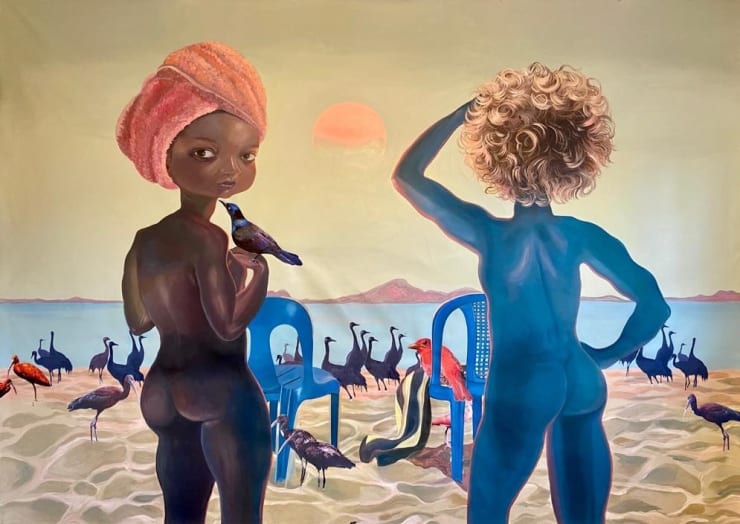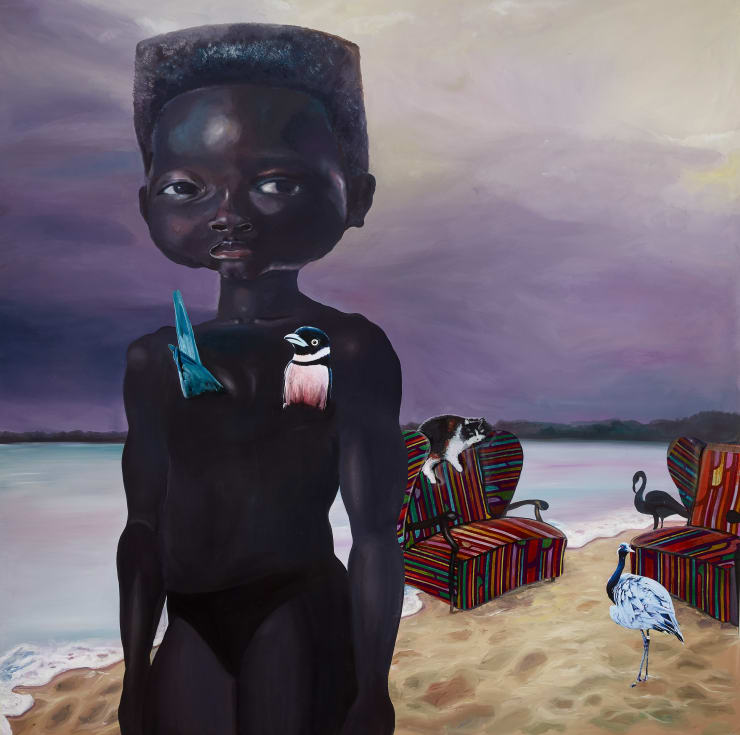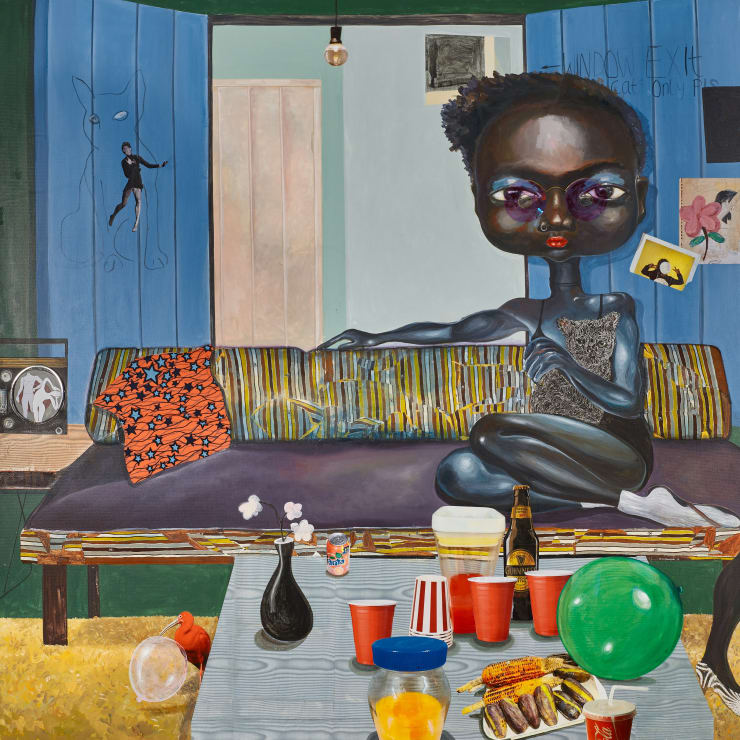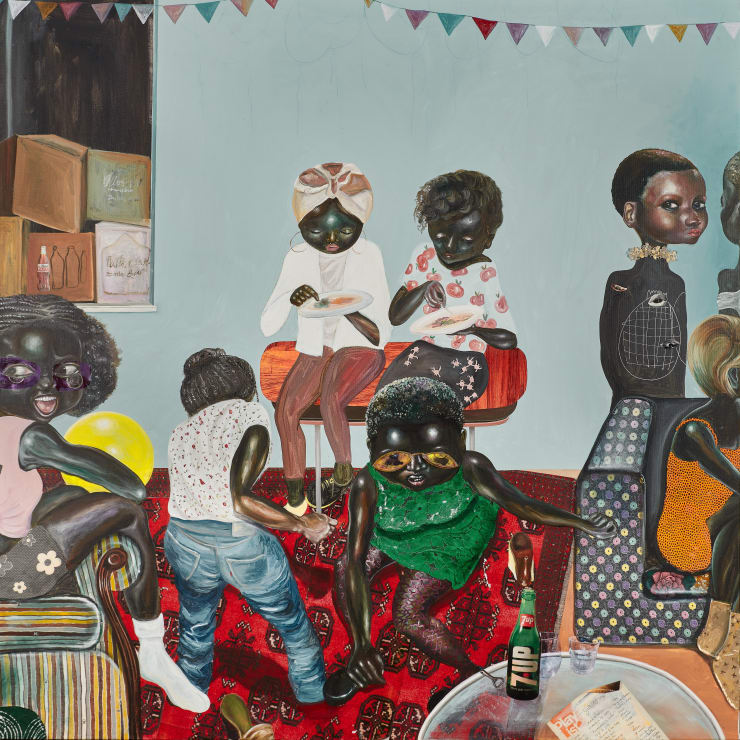The Cookout: Kinfolk and Other Intimacies is a celebration of African Diasporan traditions of gathering, particularly ways of togetherness that maintain history, culture, and ritual through active participation. The cookout can and does often represent a myriad of social experiences vital to cultural continuity and collective survival.
The featured works live across various mediums to explore tradition, family, national and personal memories, memorial ritual, gender and sexuality, childhood, and acts of leisure and pleasure. The works demark a moment and occupy the future simultaneously. This exhibition acknowledges the grand potential of Pan African connection, affording traced shared histories through cultural remnants. In the last decade, the relics of this living document, the cookout, are shared on the internet in memes, tweets, and snapshots of the quotidian. The digital realm, particularly its increased relevance during a global pandemic, prompts new concerns and possibilities about the ontology of participatory heritage.
This virtual exhibition is part of a a two-week, multisensory program presented by MoCADA celebrating Juneteenth + the communal experience of the African diaspora. To see a full schedule of events, click HERE.
FEATURED ARTISTS
Ndidi Emefiele, Evan Ifekoya, Jacolby Satterwhite, Shellyne Rodriguez, Larry Achiampong, Raelis Vasquez, Jessi Jumanji, Jamaal Peterman, E. Jane, Alexis Chivir-ter Tsegba, Zola Savage, Ken Nwadiogbu, Emmanuel Massillon, Melvin Nesbitt Jr., Nakeya Brown, and Lionel Frazier White III
PRESS RELEASE
Regarding the Gates
by Maleke Glee
Everybody, everybody wants to know
What you gonna do
Where you going to
‘Cause they wanna come
Where I’m showing you
Yes, they wanna come
Where I’m showing you
All that you could be is a spectacle
Following after every single miracle
Watch them marvel at
All the joy you have
But they’re too important to have all the joy you have
What a tragedy, you can laugh at me, you can laugh at me
But I’m in love
–“Guarding the Gates”, Lauryn Hill
Lauryn Hill’s “Guarding the Gates” describes a self-sustained love. Onlookers gaze in awe, witnessing a seemingly unfathomable joy. Regardless of an environment that should produce stagnation or depression, joy and love are sustained within, unimpressionable. Ms. Hill’s lyrics express an unsettledness, a transition, an in-between; there is a determination to reach this destination. The joy is in the journey; as the proverb goes–––if you want to go fast, go alone. If you want to go far, go together. This euphoria requires guarding protection, for there are attempts of perpetration.
The cookout in the United States mirrors gatherings across the Diaspora. The togetherness of the continent’s children created cuisine, dance, music, and an overall practice of continuity. The cookout, an amalgamation of cultural traditions, is sustained through participation. This conviviality is wondrous because of its resilience through time, space, and terror. This living relic traces kinships, migrations, and spirit in its subtle cultural footnotes. Collective memories, sacral ritual, political postures, amongst other embedded meanings, may be found on the spread. There is wisdom in the air, on the hands preparing the dishes, the games children play, and the conversations held. Recently, the world is offered a peek into what is guarded and treasured. Invitations by few grant access to tradition bore by many.
“All that you can be is a spectacle, following after every single miracle.”
In the last decade, the familial cookout tradition was truncated in its definition online, used to represent jovial Black cultural values, and expressions. In the digital realm, these experiences are displayed in memes, videos, and quotidian snapshots. #BlackTwitter is a fundamental reference in this archival frontier wherein visibility is less predicated on commercially contrived impressions, but relatable epithets. Similar to other media platforms, onlookers participate at varying extents.
Invitations to this imagined gathering were sent and revoked without precise prerequisites of entry; such an attempt would be relentless. There is no gatekeeper to the collective yard. However, the cookout cannot be traded as a badge of social mobility or perceived allyship to Black communities— such an exchange reflects troubling historical trends. A seat at the table does not equate the hours laboring the meal. It is an unspoken rule, as many are, that you should not exit with leftovers if you did not contribute to the spread. Some are ill-equipped to dutifully add to the cultural canon, having lived without the lessons over snapped peas. The cookout is embedded with modalities of cultural and social survival that continue African participatory ontology. The digital realm, particularly its increased relevance during a global pandemic, prompts new concerns and possibilities about participatory heritage. Without the availability of physical contact, how do we evolve such lore?
I remember the summer of 2019 with Beyonce’s “Before I Let Go,” sampling the Maze featuring Frankie Beverly’s cookout classic. The #BeforeILetGoChallenge quickly surfaced online, as a syncopated dance replicating, the instructions of the lyrics went viral. Seeing grandparents and grandchildren in awe of each other, learning from each other, brought me joy.
The #BeforeILetGoChallenge demarked a new trend, wherein cultural, and participatory relics are widely shared. There was no instructional video on Miss Mary Mat, Slide, or our other childhood inventions. Participation and improvisation are how these relics manifest, not from views, “influence,” or algorithms. As the year continued, dance challenge trends emphasized coopting that is not specific to social media but were exacerbated in this arena.
Jalaiah Harmo, the 14-year old creator of the dance craze the Renegade, has reshaped the internet and its rapid capitalizing potential. Jalaiah’s dance incited an outpour of creativity from her peers. However, unfortunately, Jalaiah’s story mirrors the tradition of Black creativity. Jalaiah was not initially credited nor awarded for her creation, and there was a machine to support her non-Black peers who were. Jalaiah’s original creation was not predicated on clicks and views but was made solely through practice. The Renegade is now apart of the cookout tradition. The tradition of creating, sharing, and co-creating is the Cookout.
“I’m guarding the gates.”
The Cookout: Kinfolk and Other Intimacies is a celebration of African Diasporan traditions of gathering, particularly ways of togetherness that maintain history, culture, and ritual through active participation. The featured works, using various mediums, explore tradition, family, national and personal memories, memorial ceremony, gender and sexuality, childhood, and acts of leisure. The works both demark a moment and occupy futurity. This exhibition acknowledges the grand potential of Pan African connection, affording traced shared histories through cultural remnants.
The internet and its historicizing potential inform the exhibition. The exhibition grew from an awareness of the possibility of media to an embrace of its connectivity. Opening on Juneteenth, amid a global pandemic, and ongoing memorials in the forms of protests and poems, we come together. We share our truths, “off guard”, not with an audience or filtered for the masses. We are in the cookout, holding joy and pain together. We line dance and learn. We mend our hearts behind the gates.
“I’m in Love.”
Maleke Glee is a D.C. based curator, writer, and cultural worker most interested in auto-ethnographic practice. Maleke’s current research surrounds the sustainability and economy of Go-Go, the Official Music of Washington, D.C. Maleke holds a B.F.A. in Theatre Arts from Howard University and M.A. in Cultural Sustainability from Goucher College. He is a 2019 No Longer Empty Curatorial Fellow and Museum of Contemporary African Diasporan Arts Creator in Residence.




